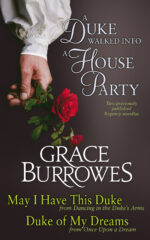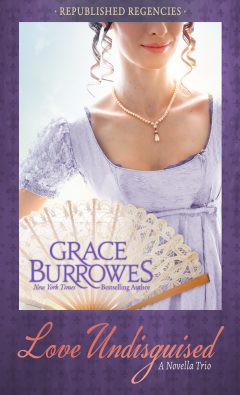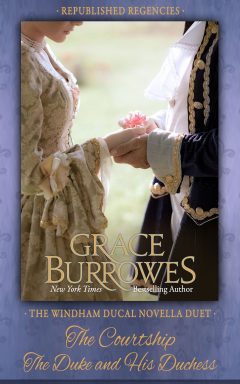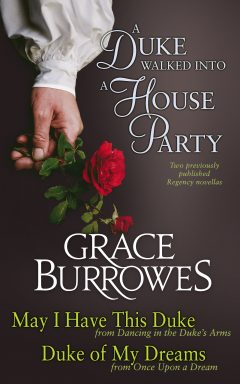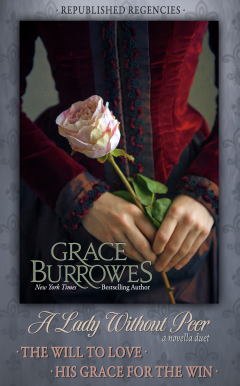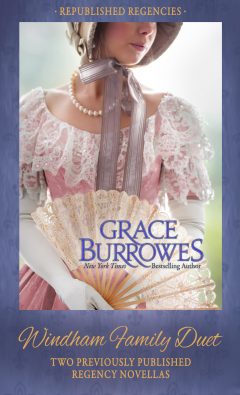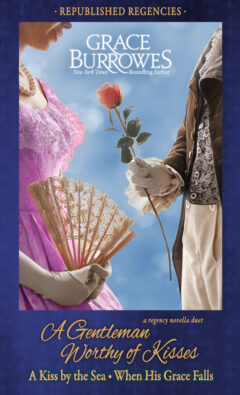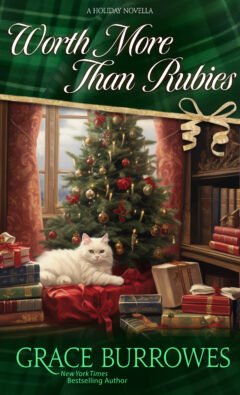A Duke Walked into a House Party
A novella in the Republished Regencies series
Two novellas previously published in separate anthologies (no longer for sale) are re-issued in one volume.
May I Have This Duke — previously available in Dancing in the Duke’s Arms
Gerard Hammersley, Duke of Hardcastle, is dragooned by an old friend into attending a house party, though Hardcastle refuses to fall prey to the matchmakers who relish such gatherings. He recruits his nephew’s prim, prickly governess, Miss Ellen MacHugh, to preserve him from being compromised by the matchmakes, and offers in exchange to deflect the amorous viscounts who plague Ellen. Ellen agrees to Hardcastle’s scheme for two reasons. First, she’s been attracted to His Grace since the day she laid eyes on him, and knows that behind Hardcastle’s lack of charm lies a ferociously loyal and faithful heart. Second, she’s departing from Hardcastle’s household at the conclusion of the house party, and two weeks safeguarding His Grace’s bachelorhood is as much pleasure—and as much torment—as she can endure before she leaves him.
The Duke of My Dreams–previously available in Once Upon a Dream
Banker’s daughter Anne Faraday is cast into the company of Elias, Duke of Sedgemere, at house party in the Lakes. Anne warms to the lonely man and conscientious father behind the title, and Elias becomes enthralled with the brilliant, burdened woman beneath Anne’s genteel facade. Liking turns to love under the Cumbrian summer moon, but family obligations, secrets, and a prodigal duck conspire to thwart the course of true love.
Enjoy An Excerpt







From The Duke of My Dreams
Chapter One
“I do not ask this boon of you lightly, Sedgemere, but you are my oldest and dearest friend.”
Elias, Duke of Sedgemere, strolled along, damned if he’d embarrass Hardcastle with any show of sentiment in the face of Hardcastle’s wheedling. His Grace of Hardcastle was, after all, Sedgemere’s oldest and dearest friend too.
Also Sedgemere’s only friend.
They took the air beside Hyde Park’s Serpentine, ignoring the stares and whispers they attracted. While Sedgemere was a blond so pale as to draw the eye, Hardcastle was dark. They were both above average in height and brawn, though Mayfair boasted any number of large, well-dressed men, particularly as the fashionable hour approached.
They were dukes, however, and to be a duke was to be afflicted with public interest on every hand. To be an unmarried duke was to be cursed, for in every ballroom, at the reins of every cabriolet, holding every parasol, was a duchess-in-waiting.
Thus Sedgemere endured Hardcastle’s importuning.
“You do not ask a boon,” Sedgemere said, nodding to a fellow walking an enormous brindle mastiff. “You demand half my summer, when summer is the best time of year to bide at Sedgemere House.”
They had known each other since the casual brutality and near starvation that passed for a boy’s indoctrination at Eton, and through the wenching and wagering that masqueraded as an Oxford education. Hardcastle, however, had never married, and thus knew not what horrors awaited him on the way to the altar.
Sedgemere knew, and he further knew that Hardcastle’s days as a bachelor were numbered, if Hardcastle’s estimable grandmama was dispatching him to summer house parties.
“If you do not come with me, Sedgemere, I will become a bad influence on my godson. I will teach the boy about cigars, brandy, fast women, and profligate gambling.”
“The child is seven years old, Hardcastle, but feel free to corrupt him at your leisure, assuming he does not prove to be the worse influence on—good God, not these two again.”
The Cheshire twins, blond, blue-eyed, smiling, and as relentless as an unmentionable disease, came twittering down the path, twirling matching parasols.
“Miss Cheshire, Miss Sharon,” Hardcastle said, tipping his hat.
Sedgemere discreetly yanked on his friend’s arm, though nothing would do but Hardcastle must exchange pleasantries as if these women weren’t the social equivalent of Scylla and Charybdis.
“Ladies.” Sedgemere bowed as well, for he was in public and the murder of a best friend was better undertaken in private.
“Your Graces! How fortunate that we should meet!” Miss Cheshire gushed. The elder by four minutes, as Sedgemere had been informed on at least a hundred occasions, she generally led the conversational charges. “I told Sharon this very morning that you could not possibly have left Town without calling upon us, and I see I was right, for here you both are!”
Exactly where Sedgemere did not want to be.
“We’ll take our leave of—” Sedgemere began, just as Hardcastle winged an arm.
“A pleasant day for pleasant company,” Hardcastle said.
Miss Cheshire latched on to Hardcastle like a Haymarket streetwalker clutched her last penny’s worth of gin, and Miss Sharon appropriated Sedgemere’s arm without him even offering.
“You weren’t planning to call on us, were you?”
Miss Sharon posed exactly the sort of query a man who’d endured five years of matrimonial purgatory knew better than to answer. If Sedgemere admitted that he’d no intention of calling on anybody before departing London, the Cheshire chit would pout, tear up, and try to shame him into an apology-call. If he lied and protested that, of course he’d been planning on calling, she’d assign him a time and date, and be sure to have her bosom bows lying in ambush with her in her mama’s parlor.
Abruptly, three weeks trudging about the hills of the Lake District loomed not as a penance owed a dear friend, but as a reprieve, even if it meant uprooting the boys.
“My plans are not yet entirely made,” Sedgemere said. “Though Hardcastle and I will both be leaving Town shortly.”
Miss Sharon was desolated to hear this, though everybody left the pestilential heat of a London summer if they could. She cooed and twittered and clung from one end of the Serpentine to the other, until Sedgemere was tempted to push her into the water simply to silence her.
“We bid you adieu,” Hardcastle said, tipping his hat once more, fifty interminable, cooing, clutching yards later. “And we bid you farewell, for as Sedgemere says, the time has come for ruralizing. I’m sure we’ll see both of you when we return to London.”
Hardcastle was up to something, Sedgemere knew not what. Hardcastle was a civil fellow, though not even the Cheshire twins would accuse him of charm. Sedgemere liked that about him, liked that one man could be relied upon to be honest at all times, about all matters. Unfortunately, such guilelessness would make Hardcastle a lamb to slaughter among the house-party set.
Amid much simpering and parasol twirling, the Cheshire ladies minced back to Park Lane, there to lurk like trolls under a bridge until the next titled bachelor came along to enjoy the fresh air.
“Turn around now,” Sedgemere said, taking Hardcastle by the arm and walking him back the way they’d come. “Before they start fluttering handkerchiefs as if the Navy were departing for Egypt. I suppose you leave me no choice but to accompany you on this infernal frolic to the Lakes.”
“Because you are becoming a bore and a disgrace and must hide up north?” Hardcastle inquired pleasantly.
“Because there’s safety in numbers, you dolt. Because if Miss Cheshire had sprung that question on you, about whether you intended to call, you would have answered her, and spent half of Tuesday in her mama’s parlor, dodging debutante décolletages and tea trays.”
Marriage imbued a man with instincts, or perhaps fatherhood did. Hardcastle was merely an uncle, but that privileged status meant he had his heir without having stuck the ducal foot in parson’s mousetrap.
“I say, that is a handsome woman,” Hardcastle muttered. Hardcastle did not notice women, but an octogenarian Puritan would have taken a closer look at the vision approaching on the path.
“Miss Anne Faraday,” Sedgemere said, a comely specimen indeed. Tall, unfashionably curvaceous, unfashionably dark-haired, she was also one of few women whose company did not send Sedgemere into a foul humor. In fact, her approach occasioned something like relief.
“You’re not dodging off into the rhododendrons,” Hardcastle said, “and yet you seem to know her.”
Would Miss Faraday acknowledge Sedgemere? She was well beyond her come out, and no respecter of dukes, single or otherwise.
“I don’t know her well, but I like her very much,” Sedgemere said. “She hates me, you see. Has no marital aspirations in my direction whatsoever. For that alone, she enjoys my most sincere esteem.”
Order your copy of A Duke Walked into a House Party, and read on for an excerpt from May I Have This Duke?….
Chapter One
“You wished to see me, Your Grace?”
Gerard Juvenal René Beaumarchand Hammersley, Eighth Duke of Hardcastle, pretended for one more moment to study his list of tenants, because he emphatically did not wish to see Miss Ellen MacHugh. The woman destroyed his focus simply by entering a room, and when she spoke, whatever remained of Hardcastle’s mental processes came to an indecorous, gaping halt.
An indecorous, gaping, sniffing halt, because Miss MacHugh had the great temerity to carry about her person the scents of lavender and lilacs.
The duke rose, for Miss MacHugh was a lady, albeit a lady in his employ. “Please have a seat, Miss MacHugh. I trust you’re well?”
They’d perfected a system, such that they could dwell in the same house for much of the year, but go for days without speaking. Weeks even. Hardcastle’s record was thirty-three days straight, though admittedly, he’d been ill for part of that time.
She, by contrast, had the constitution of a plough horse. She never lost her poise either, while he fumbled for words in her presence or prosed on about the weather.
Or some other inanity.
“I am well, Your Grace. Thank you for inquiring. Christopher is well too.”
“If he were unwell, and you had failed to notify me, you’d be without a post, madam.”
She dipped her chin, a rather stubborn little chin. Her hair was dark russet, and her height was sadly wanting, but that chin could be very expressive.
Miss MacHugh was not willowy, she was not blond, she was not subservient, she was not—oh, her faults were endless. She wasn’t even entirely English, her mother hailing from the Scottish region of Peeblesshire.
“Did you summon me for a reason, sir?”
Hardcastle clasped his hands behind his back, marched to the library window, and attempted to recall what lapse of sense had prompted him to summon—ah, yes.
“I’m to attend to a house party up in Nottinghamshire,” he said. “Christopher will accompany me, and you will accompany the boy.”
“When do we leave, Your Grace?”
“We leave Tuesday. Please ensure Christopher has everything he might require for a two-week stay in the country. You and he will share the traveling coach, and I will go on horseback. Thank you, that will be all.”
She rose to her inconsequential height, and yet, such was Ellen MacHugh’s presence that Hardcastle remained by the window, yielding the rest of the library to her.
“Has Your Grace considered tutors to take over Christopher’s education?” she asked.
What queer start was this? “He’s barely six years old, Miss MacHugh. Unless I mistake the matter, the boy is learning what he needs to learn from you. I hadn’t any tutors until I was eight.”
She flicked a gaze over him that nearly shouted: And look how well that turned out. “Christopher is exceedingly bright, Your Grace, and eager to learn.”
“As was I. Unless you believe a six-year-old boy’s education to be beyond you, this conversation has reached its conclusion.”
More and more often, when Hardcastle spoke, his grandfather’s voice emerged, condescending, gruff, and arrogant. Had Robin lived, he’d have laughed himself silly at his older brother’s metamorphosis into a curmudgeon-in-training.
“I’ll take my leave of you then, sir. I’d like to call one other item to Your Grace’s attention, though.”
Hardcastle knew that tone and knew what it portended. Miss MacHugh was preparing to scold her employer.
The woman excelled at scolding her employer. She’d been in the nursery for nearly three months before Hardcastle had realized what her gentle, polite, well-reasoned discourses were. He’d been slow to catch on, because a duke of mature years had little to no experience being scolded.
By anyone.
“Unburden yourself, Miss MacHugh. What item remains for us to discuss?”
She had the most beautiful complexion. All roses and cream, with a few faint, delicate freckles across her cheeks. Hardcastle knew better than to stand within freckle-counting range, because when he got that close to her, his thumbs ached to brush over her features.
Aching thumbs on a duke were the outside of absurd.
“I’m giving notice, Your Grace, of my intention to quit my post. I thought you might like some warning. If we leave on Tuesday, and the house party lasts two weeks, you should expect my departure from your household at the end of the house party. I leave it to you to explain the situation to Christopher at the time and place of your choosing. Good day, sir.”
She offered him a graceful curtsey and bustled off toward the door.
Hardcastle strode to the door as well, and because his legs were significantly longer, and his resolve every bit a match for Miss MacHugh’s, he was first to reach their destination.
“Miss MacHugh, after living under my roof for three years, caring for my heir, and otherwise functioning as a member of this household day in and day out, you simply announce an intention to leave?”
Of course she’d want to leave him. He was a demanding, ill-tempered, patently unfriendly employer. Hardcastle could not fathom how she’d leave the boy, though.
“This is how it’s done, Your Grace. The employee gives notice, the employer writes a glowing character. You wish me well, and I thank you for all you’ve done for me.”
She peered at him encouragingly, as if willing him to repeat that sequence of disasters back to her.
“All I have done is pay the modest wages you tirelessly earn, madam, but this giving of notice will not answer. In Nottinghamshire, I’ll be expected to socialize morning, noon, and night. The entire region is infested with dukes, thus its unfortunate style, the Dukeries. Because I myself am a duke—lest you forget that detail—I am obligated to exchange courtesy visits with half the shire.”
He kept his hand on the door latch, in case she took a notion to flee before he’d made his point. “How can I find a replacement for you if I’m dodging the hopeful young ladies?” Hardcastle went on. “Shall I interview your successor when I’m playing cards until all hours with the fellows? When I’m rising at dawn to ruin good boots tramping about in the fog, shooting at pheasants, drunken viscounts, or other low-flying game?”
Miss MacHugh turned her smile on Hardcastle, proving once again that she had no conscience. Her smile would make small boys confess to felonies and large boys long for privacy, preferably with her, a freshly made bed, and a few bottles of excellent spirits.
“Your Grace is an eminently resourceful fellow,” she said. “If you turn your mind to locating a successor for me, then I’m sure a parade of candidates will materialize in the servants’ parlor in an instant.”
Ellen MacHugh was a temple to mendacity, pretending to compliment him, while instead mocking his consequence.
“My agenda for this house party, Miss MacHugh, is to locate a candidate for the position of Duchess of Hardcastle. Her Grace, my grandmother, claims I have forgotten to tend to this task and must address the oversight before I’m a pathetic, graying embarrassment, falling asleep over the port and importuning the housemaids. I’m to parade myself before the debutantes and matchmakers, sacrifice myself once again on the altar of duty, and for good measure, be a good sport about surrendering my bachelorhood.”
And in the depths of the ducal heart, Hardcastle suppressed a plea as honest as it was dismaying: Don’t let them take me. Ellen MacHugh wouldn’t deride him for that sentiment either, for she was a woman who treasured her independence fiercely.
The corners of her serene smile faltered. “Her Grace is a formidable woman. I can understand why you’d make her request a priority. But tell me, sir, how does one forget to get married?”
One became a ducal heir at age seven, a duke at thirteen, and arrived to the age of three-and-thirty with one freedom, and one freedom only, still intact.
“I expect, Miss MacHugh, I neglected to marry the same way you did. I occupied myself with other, less disagreeable matters. Doubtless, you will now admit that your departure from the household would be most inconsiderate, particularly at this juncture. I will regard the topic as closed until further notice.”
Russet brows twitched, a gratifying hint of consternation from a woman who was the soul of self-possession.
“You have my leave to return to the nursery, madam.” They stood near the door, within freckle-counting range. The fragrance of lilacs and lavender, like a brisk, sunny morning, provoked Hardcastle into opening the door for his nephew’s governess, as if he were a common footman.
“Your Grace, I do apologize for the timing of my decision, but this once, I cannot change my plans for your convenience. I have reason to believe another situation awaits me. You have just shy of a month to replace me, sir. If you do find a lady willing to be your duchess, she will certainly take an interest in choosing Christopher’s next governess.”
Then Miss MacHigh-and-Mighty was gone, gently pulling the door closed behind her.
The voice of the previous duke nattered on in Hardcastle’s head, about good riddance to a woman who’d never known her place, and governesses being thick on the ground, and small boys of excellent station needing to learn early not to grow attached to their inferiors.
The seventh duke had been an arrogant old windbag. With a couple of bottles of port in him, he’d had the verbal stamina of a Presbyterian preacher amid a flock of adulterers.
The eighth duke didn’t care for port. He liked Ellen MacHugh’s self-possession, her good opinion of herself, her boldness before her betters, and her infernally alluring freckles.
Hardcastle had never admired or desired a woman more than he did Miss Ellen MacHugh. She had no use for him, though, so perhaps he’d best find a replacement for her after all.
Order your copy of A Duke Walked into a House Party!
End of Excerpt
A Duke Walked into a House Party is available in the following formats:
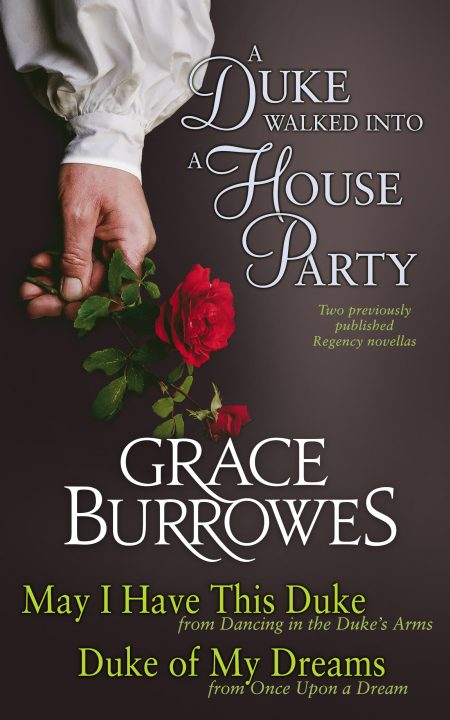
Grace Burrowes Publishing
January 15, 2020
- Grace’s BookstoreThis is Grace’s
independent
ebook store.
Your purchase can be added to any device. - Barnes & Noble Nook
- Kobo
- Apple Books
- Amazon Kindle
eBook:
Other eBook Purchase Options:
Print:
- Kobo UK
- Booktopia AUS
- Amazon Kindle UK
United Kingdom:
Connected Books
A Duke Walked into a House Party is a novella in the Republished Regencies series. The full series reading order is as follows:
- Novella: Love Undisguised
- Novella: The Windham Ducal Duet
- Novella: A Duke Walked into a House Party
- Novella: A Lady Without Peer
- Novella: Holiday Duet — Republished Regencies
- Novella: Gentleman Seeks a Lady
- Novella: Windham Family Duet
- Novella: The Duke and the April Flowers
- Novella: Love Disguised (A Previously Published Regency Short Story)
- Novella: A Gentleman Worthy of Kisses
- Novella: Worth More Than Rubies












